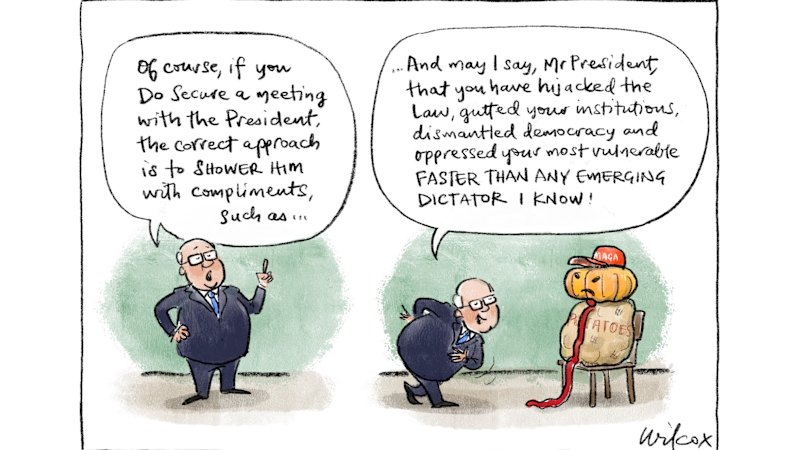
Former Australian High Commissioner to the United Kingdom, George Brandis, recently criticized Prime Minister Anthony Albanese, labeling him “weak and diplomatically clueless” for not yet meeting with former U.S. President Donald Trump. This comment, made in an article published on August 25, 2023, has sparked a debate over the appropriateness of Albanese’s diplomatic approach toward the controversial figure.
Supporters of Albanese argue that his reluctance to engage with Trump reflects a prudent understanding of the political landscape. They contend that the Prime Minister’s decision to maintain distance from Trump is wise, given the former president’s unpredictable nature and controversial reputation. Many believe that entering into discussions with Trump may not yield beneficial results for Australia, especially when dealing with a leader known for prioritizing personal interests over diplomatic relations.
Critics of Brandis’s comments include various Australian citizens who express their support for Albanese’s stance. Maria Liew from Woodend stated, “Albanese is wise to keep his distance as deals done with Trump are never guaranteed.” This sentiment resonates with many voters who prefer their leader to avoid unnecessary entanglements with a figure perceived as a “capricious bully.”
A significant factor in this debate is the public opinion on Trump in Australia, where he is widely regarded unfavorably. As noted by James Young from Mount Eliza, “the majority of Australian voters would prefer our leader not to kow-tow to a dangerous buffoon.” This perspective indicates that the Australian public values a leader who prioritizes national interests over seeking approval from foreign powers.
The broader context of Albanese’s foreign policy strategy also plays a crucial role in this discussion. His successful engagements with other international leaders, such as those in China and Indonesia, suggest that his diplomatic skills are not lacking, contrary to Brandis’s assertions. Mark Freeman from Macleod argues that Albanese is adept at reading the sentiments of the Australian public, noting, “Our PM is reading the Australian public mood better than Brandis and the Liberals in general.”
Furthermore, there are practical considerations regarding the potential benefits of a meeting with Trump. Many Australians question what tangible advantages could arise from such an engagement, especially given Trump’s history of erratic behavior and shifting political stances. As highlighted by Graham Devries from Camberwell, “the US does not share our inflated view of our importance on the international stage,” suggesting that a meeting may not be necessary or beneficial for Australian interests.
As this discourse unfolds, it is clear that Albanese’s handling of the situation resonates with many Australians. The Prime Minister’s cautious approach is seen as a reflection of strength rather than weakness, reinforcing the idea that diplomatic engagement should be grounded in the interests of the nation rather than mere political theatrics.
In conclusion, as the debate continues, it remains to be seen how Albanese will navigate his relationship with the United States under the leadership of Trump or any future administrations. What is evident is that the Prime Minister’s current strategy is resonating with a significant segment of the Australian population, who prioritize national integrity over political posturing on the global stage.







